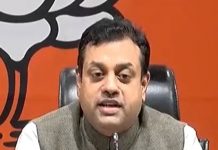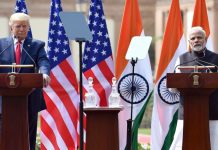
A clamour is up to name Gujarat Chief Minister Narendra Modi as the BJP’s prime ministerial candidate at India’s general election next year. His backers say he should be judged for bringing development to his state. His opponents hold him responsible for the killing of Muslims in 2002 by Hindu sectarian and supremacist mobs. Just what do you think makes Modi a front-ranker?
A startling absence of talent in mainstream politics. Modi, the argument goes from the Right may be a killer, but he’s a developmental killer. So if a few thousand Muslim lives have to be sacrificed to build a solid electoral base, “modernise” Gujarat, and by extension, India, then why not? At least, they say, he’s not hypocritical. The Right see him as a potential unifier for their project, which is not as some on the Left argue, to create a fascist state in India, but to establish a long-term hegemony for the Right: an authoritarian ethno-religious populism on the basis of which Indian capitalism can be strengthened and its opponents weakened for at least a decade or two. The Congress, both in Gujarat and elsewhere, is incapable of taking him on and so accepts to fight on the battleground that the BJP has demarcated. A fatal weakness which no dynasty can transcend. How can the Nehru-Gandhis compete with the real epics of Hinduism?
A substantial section of India’s middle class, especially the educated English-speaking people, appears to solidly back Modi for prime minister. What is their motivation?
For the reasons I have stated above. And they want a period of stability, some control over corruption, some softish religion, so they can identify with in this time of uncertainties. The BJP fills the vacuum. Nehruvian nationalism is over. Its substitute is an ethno-religious chauvinism. This is the Indian version of the Muslim Brotherhood in Egypt, which also has large support within the middle classes. The BJP has its own equivalent of salafis and its ‘soft’ believers. Modi satisfies both sides.
Isn’t it ironic that Prime Minister Manmohan Singh, who was once the darling of the Indian middle classes, is now pilloried by them as ineffective, weak and inefficient? Why do you think the middle classes and the intelligentsia have turned their back on him?
Because for them (and for anyone else) he is ineffective, weak and inefficient. An old financial bureaucrat out of his depth in the swamp of Indian politics, he rules courtesy of Sonia Gandhi. He is a pathetic figure and they can’t cover this up any longer. Will Rahul Gandhi be any better? I doubt it, though he will project a pseudo-dynamism that will mean nothing in real terms and will not be able to confront the BJP.
In the last two years India has seen unprecedented focus from activists and common citizens on government corruption. Nationwide protests have been covered unendingly on television. A whole new political party has been launched by anti-graft activists. Where do you locate that public movement in today’s India? Do you fancy the electoral chances for this new political party?
I am, in general, favourable to activism and social movements and hostile to graft and corruption. But leaping from this to an anti-politics political party is usually little more than a thunderbolt from a blue sky. It startles but its impact is limited. Look at the Pirate Party in Germany and Sweden or the demagogic movement of the Italian clown, Beppe Grillo. The only continent where social movements have led to political parties that have pushed through serious social and political reforms is in South America. And the new Indian party is far removed from the latter.
You must have followed the news of the gruesome death by burning of a factory manager at India’s largest automobile company, Maruti, near New Delhi a few months ago. Workers protesting for months with a slew of demands had allegedly attacked him. How do you see that incident and what does it say about labour-industry relations in India’s liberalised economy?
In the old days, confident of their political strength, workers in many parts of the subcontinent developed the gherao: occupy a factory and lay siege to its owners/managers. They were never, as far as I can remember, killed. Today there is hardly any political self-confidence within the workers movement. A class in itself? Certainly. But a class for itself? Not really. Angry, embittered, desperate, abandoned by the mainstream parties, workers burn an individual to demonstrate their frustration. Tragic but the reasons are obvious.
India‘s foreign policy was once premised on the ends of social and political justice. It was one of the few nations described as the conscience keepers of the world. When and how did that change?
Whether it was ever premised on that rather than an enlightened self-interest is debatable. But in any case, all that has gone. The collapse of the Soviet Union in the 1990s was the decisive event in this regard. It witnessed the emergence of the US as the only global power and the Indian elite buckled under the pressure.










